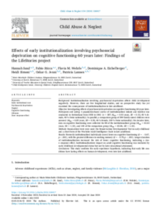Background
Institutionalization involving psychosocial deprivation affects child development negatively. However, there are few longitudinal studies, and no prospective study has yet examined the consequences of institutionalization in late adulthood.
Objective
Investigating effects of psychosocial deprivation on cognitive functioning 60 years later.
Participants and setting
A population-based survey of institutionalized infants and toddlers was conducted in Switzerland from 1958 to 1961 (n = 387; Mage = 0.93 years, SD = 0.53, 48 % female, 48 % Swiss nationality). In parallel, a comparison group of 399 family-raised children were assessed (Mage = 0.85 years, SD = 0.50, 46 % female, 100 % Swiss nationality). Six decades later, data on cognitive functioning were collected for 88 of the institutionalized group (Mage = 62.63 years, SD = 1.32), and 148 of the comparison group (Mage = 65.06, SD = 1.32).
Methods
Standardized tests were used: the Brunet-Lézine Developmental Test in early childhood and a short form of the Wechsler Adult Intelligence Scale in late adulthood.
Results
Formerly institutionalized individuals scored lower on cognitive functioning (d = − 0.67, p < .001), with the greatest difference in working memory (d = −0.78, p < .001). Longer duration of institutionalization increased the risk of lower cognitive functioning, indicating a dose–response effect. Institutionalization's impact on adult cognitive functioning was mediated by early childhood developmental status but not by later educational attainment.
Conclusions
This study confirms the early experience hypothesis, indicating that early life conditions have lasting effects on human development, even into late adulthood.

